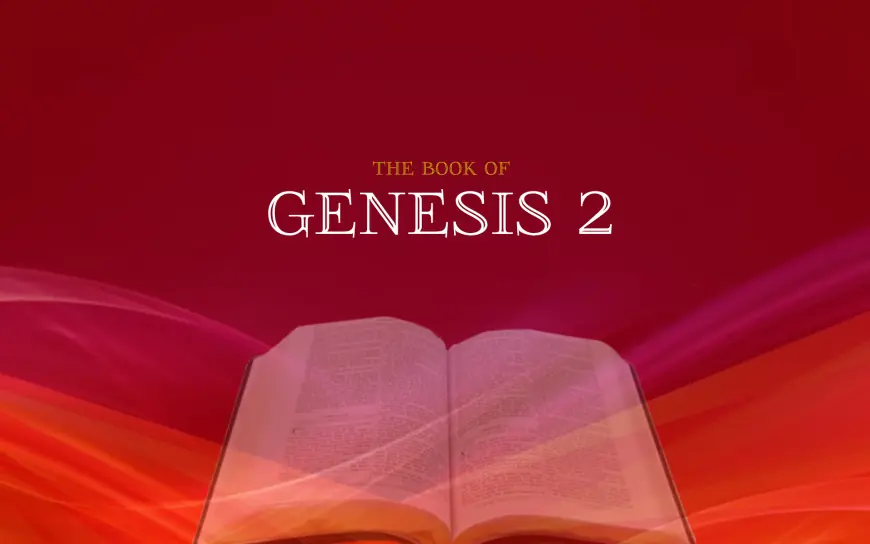Genesis 2
SGTJ: Free Bible reading, and easy commentaries without distractions. The Book of Genesis 2, the second book of the Holy Bible, covers: the history of God rest, Man and Woman in the Garden, and more

HOLY BIBLE
THE BOOK OF GENESIS 2
KING JAMES VERSION
| ◄ Genesis 2 ► |
1 Thus the heavens and the earth were finished, and all the host of them.
2 And on the seventh day God ended his work which he had made; and he rested on the seventh day from all his work which he had made.
3 And God blessed the seventh day, and sanctified it: because that in it he had rested from all his work which God created and made.
4 These are the generations of the heavens and of the earth when they were created, in the day that the LORD God made the earth and the heavens,
5 And every plant of the field before it was in the earth, and every herb of the field before it grew: for the LORD God had not caused it to rain upon the earth, and there was not a man to till the ground.
6 But there went up a mist from the earth, and watered the whole face of the ground.
7 And the LORD God formed man of the dust of the ground, and breathed into his nostrils the breath of life; and man became a living soul.
The Planting of the Garden
8 And the LORD God planted a garden eastward in Eden; and there he put the man whom he had formed.
9 And out of the ground made the LORD God to grow every tree that is pleasant to the sight, and good for food; the tree of life also in the midst of the garden, and the tree of knowledge of good and evil.
10 And a river went out of Eden to water the garden; and from thence it was parted, and became into four heads.
11 The name of the first is Pison: that is it which compasseth the whole land of Havilah, where there is gold;
12 And the gold of that land is good: there is bdellium and the onyx stone.
13 And the name of the second river is Gihon: the same is it that compasseth the whole land of Ethiopia.
14 And the name of the third river is Hiddekel: that is it which goeth toward the east of Assyria. And the fourth river is Euphrates.
The Forbidden Fruit
15 And the LORD God took the man, and put him into the garden of Eden to dress it and to keep it.
16 And the LORD God commanded the man, saying, Of every tree of the garden thou mayest freely eat:
17 But of the tree of the knowledge of good and evil, thou shalt not eat of it: for in the day that thou eatest thereof thou shalt surely die.
Adam Names the Animals
18 And the LORD God said, It is not good that the man should be alone; I will make him an help meet for him.
19 And out of the ground the LORD God formed every beast of the field, and every fowl of the air; and brought them unto Adam to see what he would call them: and whatsoever Adam called every living creature, that was the name thereof.
20 And Adam gave names to all cattle, and to the fowl of the air, and to every beast of the field; but for Adam there was not found an help meet for him.
The Creation of Woman
21 And the LORD God caused a deep sleep to fall upon Adam, and he slept: and he took one of his ribs, and closed up the flesh instead thereof;
22 And the rib, which the LORD God had taken from man, made he a woman, and brought her unto the man.
23 And Adam said, This is now bone of my bones, and flesh of my flesh: she shall be called Woman, because she was taken out of Man.
24 Therefore shall a man leave his father and his mother, and shall cleave unto his wife: and they shall be one flesh.
25 And they were both naked, the man and his wife, and were not ashamed.
| ◄ Genesis 2 ► |
|
Read the full Holy Bible on King James Bible Online Read the full Holy Bible on OpenBible. See all Free Bible Resources |
COMMENTARY
Commentary on Genesis 2 by BibleRef
Genesis 2 begins by describing the end of God's week of creation. Chapter 1 described what God had created day by day, for six days. The first verses of chapter 2 explain the seventh day, in which God rested from His work.
The remainder of chapter 2 focuses more details on the creation of the first man, the garden God placed him in, and the work God gave him to do. Before man was created, there were no cultivated crops, and the land was watered by streams or mists rising up from the ground.
In this passage, God creates man, forming him out of the dust of the ground and breathing the "breath of life" into him. Man becomes a living being. God places man into His newly planted garden in the region of Eden, a garden with abundant fruit-bearing trees. Two trees in the middle of the garden stand out. They have names: The Tree of Life and the Tree of the Knowledge of Good and Evil.
For all of the debates over which aspects of Genesis are meant to be literal, and which are meant to be symbolic, the Garden of Eden is not so difficult to interpret. The writer of Genesis clearly intends it to be understood as a real place in the real world. This portion of Scripture describes the river that runs out of it and divides into four separate rivers. Those rivers run through places that would have been especially familiar to Genesis' first readers. They include the Tigris and Euphrates, rivers that still flow through the lands of Mesopotamia.
God places the man in the garden with specific work to do, such as maintaining the garden and naming the animals. God also issues a single, specific negative command: never eat from the Tree of the Knowledge of Good and Evil, or you will die.
This passage is also the first time when God recognizes that some aspect of His creation is not good. It's not good for the man to be alone. There are no living things which complement Adam as the animals of the same kind correspond to each other. So God takes a rib from Adam and makes a helper and companion for him. Eve becomes Adam's wife. This is a fascinating action by God, one that is rich in symbolism. God obviously could have created Eve from dust, as He did Adam, but chose instead to form her out of Adam's own body.
For this reason, the closing verses tell us, men are to separate from their parents and stick to their wives, becoming one flesh with them.
Adam and Eve's relationship was unique in all of history. When they met, no sin yet existed in the world or between them. They remained unashamed of anything, including their own nakedness. In their innocence, they had nothing to hide from God or from each other. In that way, they truly existed in paradise, one beyond just the plants and animals of a garden. Unfortunately, in chapter three, this ideal situation will be lost as a result of their choice to sin against God.
Read more commentaries on BibleRef.
Files
What's Your Reaction?





























